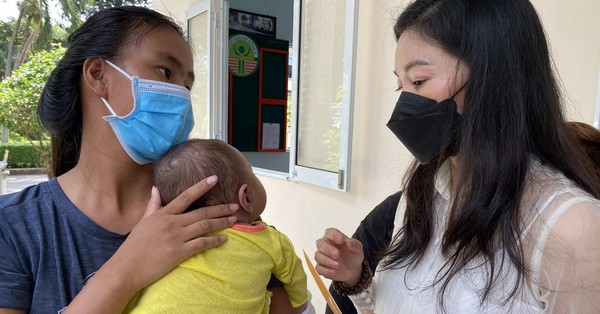Dangerous diseases that can be prevented with vaccines
According to BSCKI. Nguyen Khoi – Department of Pediatrics, University of Medicine and Pharmacy Hospital, Ho Chi Minh City. In Ho Chi Minh City facility 2, vaccines and vaccinations are the most effective means of preventing infectious diseases, reducing morbidity and mortality rates. The essence of vaccination is to use the vaccine to stimulate the body to produce specific antibodies against a certain infectious disease.
About 85-95% of vaccinated children will have specific immunity that protects the body from getting that disease again. It is estimated that vaccines save the lives of about 2.5 million children who do not die from infectious diseases every year around the world.
When not infected, vaccinated people, especially children, will be healthy, without sequelae or deformities, creating conditions for normal physical and brain development.
Some diseases that can be prevented with vaccines include:
Rabies
Rabies is an acute infectious disease caused by the rabies virus transmitted through mucous membranes or wounds caused by rabies animals. Patients with the disease often show fear of water, fear of wind, fear of light, or agitation, convulsions and then quickly die.
Vaccination against rabies is the best way to avoid rabies when bitten by a rabid animal. Individuals at high risk due to the nature of their work can also be vaccinated against rabies.
Tetanus
Tetanus is an infectious disease caused by bacteria that spread through wounds on the skin. Patients present with difficulty swallowing, stiff jaw, choking, stiff back muscles, neck muscles, convulsions. Tetanus can cause many dangerous complications, long treatment time, high cost and high risk of death. Vaccination against tetanus is the most effective.
Hepatitis B
Hepatitis B is a disease caused by a virus. The virus damages the liver silently, showing very little with fever, jaundice, and yellow eyes. If the patient has good resistance, the body will fight the virus on its own and overcome, but if not, the disease will gradually progress to cirrhosis, liver cancer. The most effective way to prevent hepatitis B is to get the hepatitis B vaccine.
Measles
Measles is a viral illness with symptoms such as fever, body rash, cough, runny nose, and red eyes. The sign that distinguishes measles from other rashes is that it begins behind the ears, then spreads to the face, down the neck, abdomen, back, and hands and feet. The diving board will leave bruises on the skin.
Measles is a very common disease in our country, so it is recommended to vaccinate against measles since the child is 9 months old, and then one more dose when the child is 18 months old. In addition, measles vaccine is also combined in a 3-in-1 vaccine (measles – mumps – rubella) which is given to children from 12 months of age.
Mumps
Mumps is a viral disease that is transmitted through the respiratory tract. Mumps causes symptoms such as fever, fatigue, swelling of the salivary glands, parotid glands, and submandibular glands. The disease can cause dangerous complications such as encephalitis, myocarditis and infertility in boys.
The disease has no specific treatment. Currently, mumps can be prevented by vaccination, the vaccine used is the 3-in-1 (measles – mumps – rubella) vaccine given to children from 12 months of age.
Rubella disease
Rubella causes symptoms such as fever and a generalized rash, which is usually not dangerous or serious. However, pregnant women infected with the disease can leave serious sequelae to the baby.
Currently, rubella can be prevented by vaccination, the vaccine used is the 3-in-1 (measles – mumps – rubella) vaccine given to children from 12 months of age. Women avoid pregnancy for 3 months after the injection.
Japanese Encephalitis
Japanese encephalitis is caused by a virus that is transmitted by mosquitoes. The onset of illness is sudden fever, fatigue, headache, nausea and vomiting. After 3-4 days, the patient may have convulsions, lethargy, coma and death. The mortality rate is about 20% of cases.
Vaccination is still the most important way to prevent Japanese encephalitis. Vaccine against Japanese encephalitis is started for children 9 months of age and older.
Meningococcal meningitis
Meningitis is also an infectious disease caused by meningococcal bacteria types A, B, C, Y and W135. This bacteria is transmitted from person to person through bodily fluids when coughing or sneezing. The disease causes lethargy, delirium, coma and convulsions, with a mortality rate of about 50% in children.
Currently, there is a vaccine against meningococcal meningitis B and C strains (VA-Mengoc BC, manufactured in Cuba) that can be given to children 6 months of age and older.
Chicken pot
Chickenpox (chickenpox) is a disease caused by the Varicella zoster virus, which is common in children, causing a rash and blisters all over the body. Chickenpox is very contagious, especially in crowded environments such as kindergartens, kindergartens, and schools. The disease can cause dangerous complications such as skin infections, encephalitis, and transverse myelitis.
Currently, we can give the chickenpox vaccine to children 12 months and older.
Flu
Influenza is a disease caused by the Influenza virus, which affects all subjects. The disease is transmitted through the respiratory tract, causing fever, cough, headache, sore throat, muscle pain. The flu can now be prevented with an annual vaccination and can be started from 6 months of age.
Typhoid disease
Typhoid is an infectious disease caused by Salmonella bacteria transmitted through the gastrointestinal tract through food and drinking water carrying the disease. The disease is characterized by high fever, lethargy, loose diarrhea, and abdominal distension. Gastrointestinal bleeding and intestinal perforation are two common complications that can be fatal in late or untreated cases.
The most specific, proactive and effective method of preventing typhoid fever is vaccination for children from 2 years of age.
Diphtheria
Diphtheria is a toxic infection caused by the diphtheria bacteria. Diphtheria bacilli produce toxins that damage many organs and tissues in the body. The disease is spread by inhalation and direct contact. Causes nasopharyngeal infections and leads to death.
The disease manifests with early symptoms of sore throat, loss of appetite, low-grade fever. Within 2-3 days will appear white pseudomembranous in throat and tongue (tough, sticky, easy to bleed when peeled). May die within 6-20 days. The most effective way to prevent diphtheria is to get the diphtheria vaccine.
Currently, diphtheria vaccine is often combined in a 6-in-1, 5-in-1 vaccine to prevent diphtheria and other diseases including whooping cough, tetanus, polio, hepatitis B, and Hib. 2 months old and up.
Whooping cough disease
Whooping cough is a contagious respiratory disease caused by bacteria in the mouth, nose and throat. Children with this condition usually have a cough that lasts 4 to 8 weeks. Pneumonia is the most common and potentially fatal complication.
The vaccine against whooping cough, usually in combination with the diphtheria and tetanus vaccine (DPT). Currently, children 2 months of age and older can receive a combination vaccine of diphtheria, pertussis, tetanus, hepatitis B, Hib and possibly polio.
at Blogtuan.info – Source: Afamily.vn – Read the original article here


